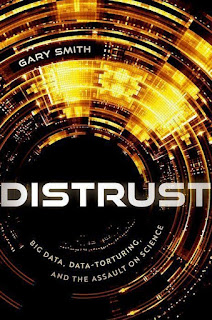Smith makes the important point that in a world where we are presented with interpretations of so much data, a clear understanding of these three factors is essential if we are to make any sense of what we hear and read. While disinformation is often a problem when non-scientists present 'their truth' that is often used to attack science, data torturing and data mining is often undertaken by scientists themselves, reducing public trust in something that is essential for the functioning of modern society.
We then get a shorter section on AI, which makes the important point that most AI is not intelligent, nor is it flexible. Here he also takes on earlier versions of ChatGPT and the like and reasonably assesses their shortcomings, though he doesn't mention some of the areas where the technology is genuinely worrying, such as generating plausible student essays. But the nature of AI's intelligence or lack of it is better covered elsewhere, notably in Smith's excellent title The AI Delusion, and isn't the main thrust of this book.
Finally, Smith pulls it all together, looking at poor reproducibility, where scientists' results, for example, don't actually match the underlying data, highlighting the replication crisis, where attempts to replicate experiments fail, and delivering his solution for 'restoring the lustre of science'. The reproducibility and replication sections are excellent. The solutions are less so - but that's not really a criticism. It is just very difficult to come up with answers to these problems. There's a lot more chance with those involving scientific misdemeanours, such as the suggestion to reduce the importance given to statistical significance (as opposed to value of a result), and more importance given to quality, replicability and reproducibility - but almost inevitably the solutions on the disinformation side are much less likely to have much of an impact.
So far, so good - an important point is being made here, and though I've seen a lot in the media about the disinformation aspect, Smith does a service in making clear how easy it is to distort the interpretation of data using the other two means. Unfortunately, though there are some aspects of the book that didn't quite work for me. In part it's the way it's written, and in part a worry about the handling of a particular piece of data.
Smith has a light style despite the topic, but I sometimes found it too jaunty for a serious science book. For example, he refers to inhabitants of the UK as 'Brits'. If a UK-based writer referred to Americans as 'Yanks' in a science book I think it would rightly raise a few eyebrows. Sometimes, too, the structure doesn't quite work. For example, Smith gives us chapters on specific areas where the three factors come into play. In one of the disinformation chapters on 'Elite conspiracies', some of the subsections are on conspiracy theories driven by disinformation, but others, such as the Pentagon Papers, use of animal 'spies', and 24/7 surveillance, are about examples where the conspiracies were effectively real - however, there's no distinction made between the sections in the flow of the chapter. This doesn't work well - and this unusually unstructured approach continues through other chapters.
The factual error (entertainingly in a chapter on 'the post-fact world') was that Smith tells us 'The Sun, a UK tabloid newspaper that publishes all sorts of nonsense, has long included the disclaimer "SUN stories seek to entertain and are about the fantastic, the bizarre, and paranormal... The reader should suspend belief for the sake of enjoyment."' Unfortunately this disclaimer is taken not from The Sun, which is one of the largest circulation UK national newspapers, but from Sun, a now-defunct US supermarket tabloid. It might seem heavy-handed to point this out, but Smith claims a tool for spotting disinformation is when it looks doubtful. No one in the UK would fail to spot that this is wrong - the error demonstrates well how that ability to uncover disinformation is highly dependent on context and on your personal experience.
The concerns don't undo the fact that this is an important topic and Smith highlights issues in the areas of data torturing and data mining extremely well that haven't been exposed as much as they should be. It's a useful and timely book, but perhaps could have benefited from a more forceful editor.
Review by Brian Clegg - See all Brian's online articles or subscribe to a weekly email free here




I don't see how you can discuss public distrust of science without mentioning those who deliberately generate such mistrust; for example the entire climate "scepticism" industry, "scientific" creationism, and, as we have seen in the case of Covid with deadly results, those who for political reasons undermine government mandates simply because they come from government.
ReplyDeleteThose aspects are definitely included under the 'disinformation' part, but have been fairly widely covered elsewhere - I focused more on the other two parts because they are less written about. They are also used as ammunitions by those who do deliberately generate mistrust.
Delete